Macquarie University ACCG924 Taxation Law Case Study Report
VerifiedAdded on 2022/12/20
|8
|1906
|31
Report
AI Summary
This report provides a comprehensive analysis of a taxation law case study, addressing various tax-related issues faced by an individual named Fiona. The report explores the concepts of assessable income, including income from employment, bonuses, and overseas income, referencing relevant legislation such as ITAA 1936 and ITAA 1997. It also examines capital gains tax (CGT) implications related to the sale of shares and property, considering pre-CGT assets and the CGT discount method. The analysis incorporates relevant case law, such as Scott v CT, Dean & Anor v CFT, and FCT v Payne, to support the conclusions. The report considers the tax treatment of different income sources and events, providing a detailed application of tax principles to Fiona's specific circumstances, including her employment, overseas investments, and capital gains. The report concludes with a summary of Fiona's assessable income and the tax implications of her various financial activities. The report also contains references to the sources used.
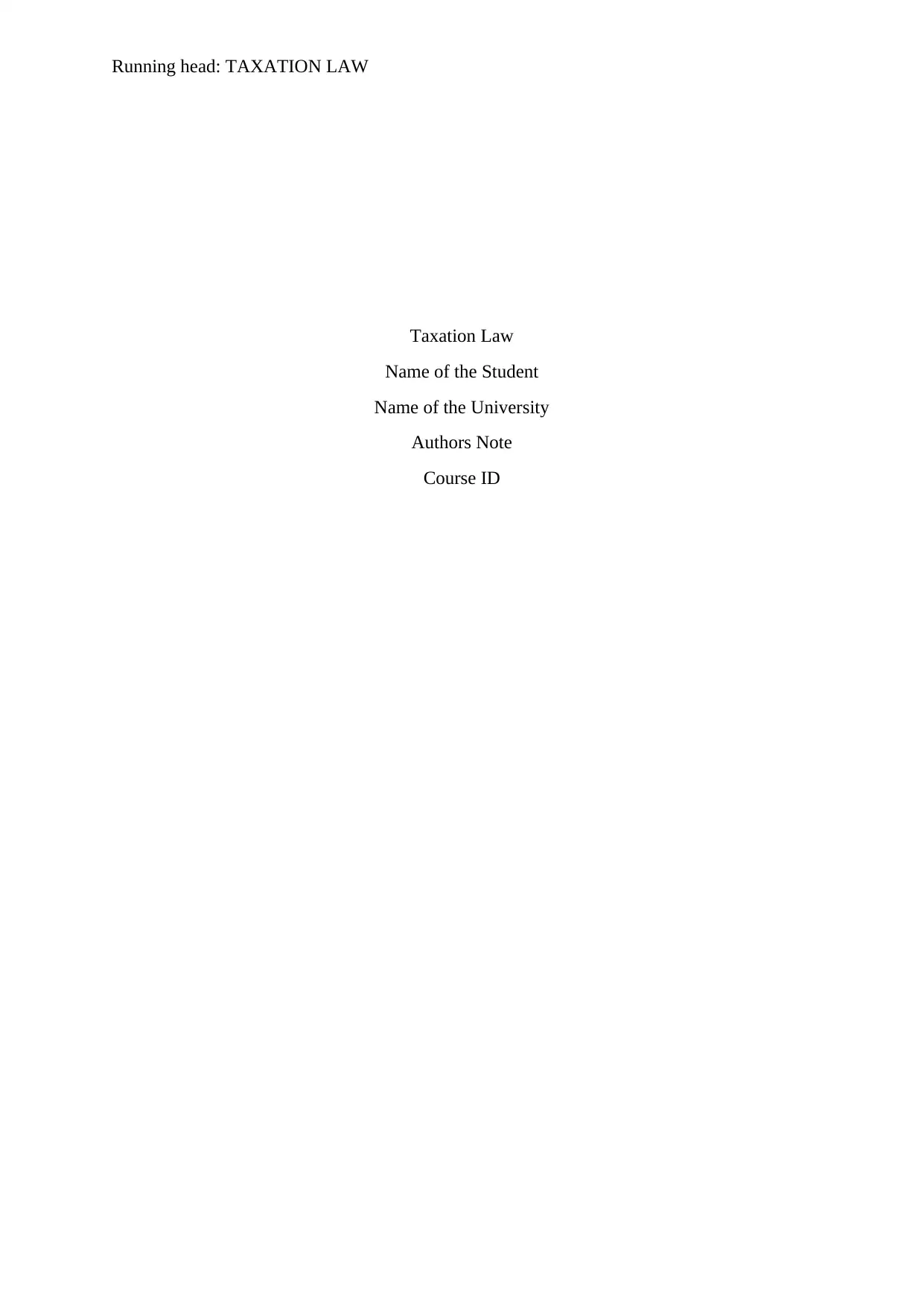
Running head: TAXATION LAW
Taxation Law
Name of the Student
Name of the University
Authors Note
Course ID
Taxation Law
Name of the Student
Name of the University
Authors Note
Course ID
Paraphrase This Document
Need a fresh take? Get an instant paraphrase of this document with our AI Paraphraser
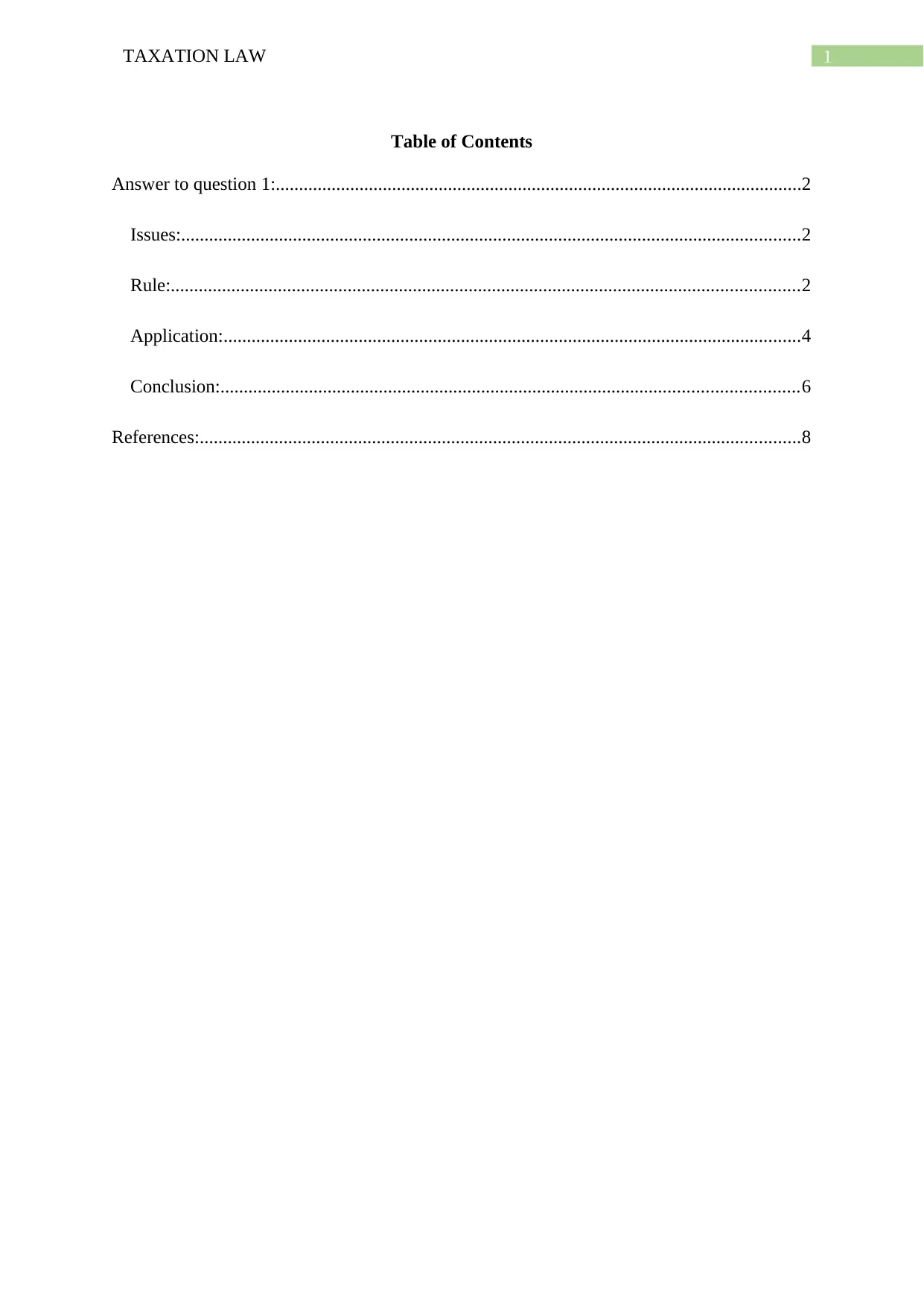
1TAXATION LAW
Table of Contents
Answer to question 1:.................................................................................................................2
Issues:.....................................................................................................................................2
Rule:.......................................................................................................................................2
Application:............................................................................................................................4
Conclusion:............................................................................................................................6
References:.................................................................................................................................8
Table of Contents
Answer to question 1:.................................................................................................................2
Issues:.....................................................................................................................................2
Rule:.......................................................................................................................................2
Application:............................................................................................................................4
Conclusion:............................................................................................................................6
References:.................................................................................................................................8
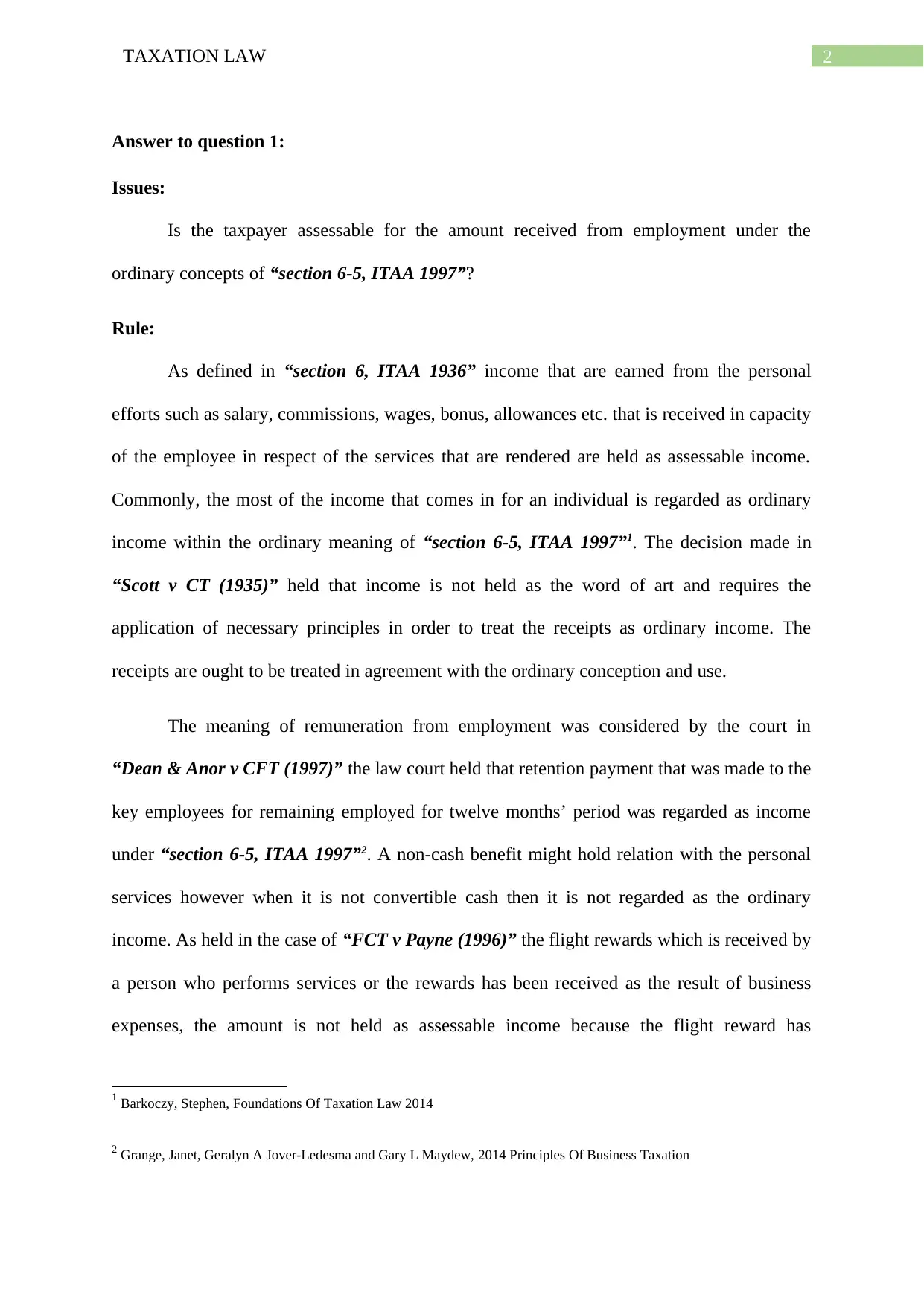
2TAXATION LAW
Answer to question 1:
Issues:
Is the taxpayer assessable for the amount received from employment under the
ordinary concepts of “section 6-5, ITAA 1997”?
Rule:
As defined in “section 6, ITAA 1936” income that are earned from the personal
efforts such as salary, commissions, wages, bonus, allowances etc. that is received in capacity
of the employee in respect of the services that are rendered are held as assessable income.
Commonly, the most of the income that comes in for an individual is regarded as ordinary
income within the ordinary meaning of “section 6-5, ITAA 1997”1. The decision made in
“Scott v CT (1935)” held that income is not held as the word of art and requires the
application of necessary principles in order to treat the receipts as ordinary income. The
receipts are ought to be treated in agreement with the ordinary conception and use.
The meaning of remuneration from employment was considered by the court in
“Dean & Anor v CFT (1997)” the law court held that retention payment that was made to the
key employees for remaining employed for twelve months’ period was regarded as income
under “section 6-5, ITAA 1997”2. A non-cash benefit might hold relation with the personal
services however when it is not convertible cash then it is not regarded as the ordinary
income. As held in the case of “FCT v Payne (1996)” the flight rewards which is received by
a person who performs services or the rewards has been received as the result of business
expenses, the amount is not held as assessable income because the flight reward has
1 Barkoczy, Stephen, Foundations Of Taxation Law 2014
2 Grange, Janet, Geralyn A Jover-Ledesma and Gary L Maydew, 2014 Principles Of Business Taxation
Answer to question 1:
Issues:
Is the taxpayer assessable for the amount received from employment under the
ordinary concepts of “section 6-5, ITAA 1997”?
Rule:
As defined in “section 6, ITAA 1936” income that are earned from the personal
efforts such as salary, commissions, wages, bonus, allowances etc. that is received in capacity
of the employee in respect of the services that are rendered are held as assessable income.
Commonly, the most of the income that comes in for an individual is regarded as ordinary
income within the ordinary meaning of “section 6-5, ITAA 1997”1. The decision made in
“Scott v CT (1935)” held that income is not held as the word of art and requires the
application of necessary principles in order to treat the receipts as ordinary income. The
receipts are ought to be treated in agreement with the ordinary conception and use.
The meaning of remuneration from employment was considered by the court in
“Dean & Anor v CFT (1997)” the law court held that retention payment that was made to the
key employees for remaining employed for twelve months’ period was regarded as income
under “section 6-5, ITAA 1997”2. A non-cash benefit might hold relation with the personal
services however when it is not convertible cash then it is not regarded as the ordinary
income. As held in the case of “FCT v Payne (1996)” the flight rewards which is received by
a person who performs services or the rewards has been received as the result of business
expenses, the amount is not held as assessable income because the flight reward has
1 Barkoczy, Stephen, Foundations Of Taxation Law 2014
2 Grange, Janet, Geralyn A Jover-Ledesma and Gary L Maydew, 2014 Principles Of Business Taxation
⊘ This is a preview!⊘
Do you want full access?
Subscribe today to unlock all pages.

Trusted by 1+ million students worldwide
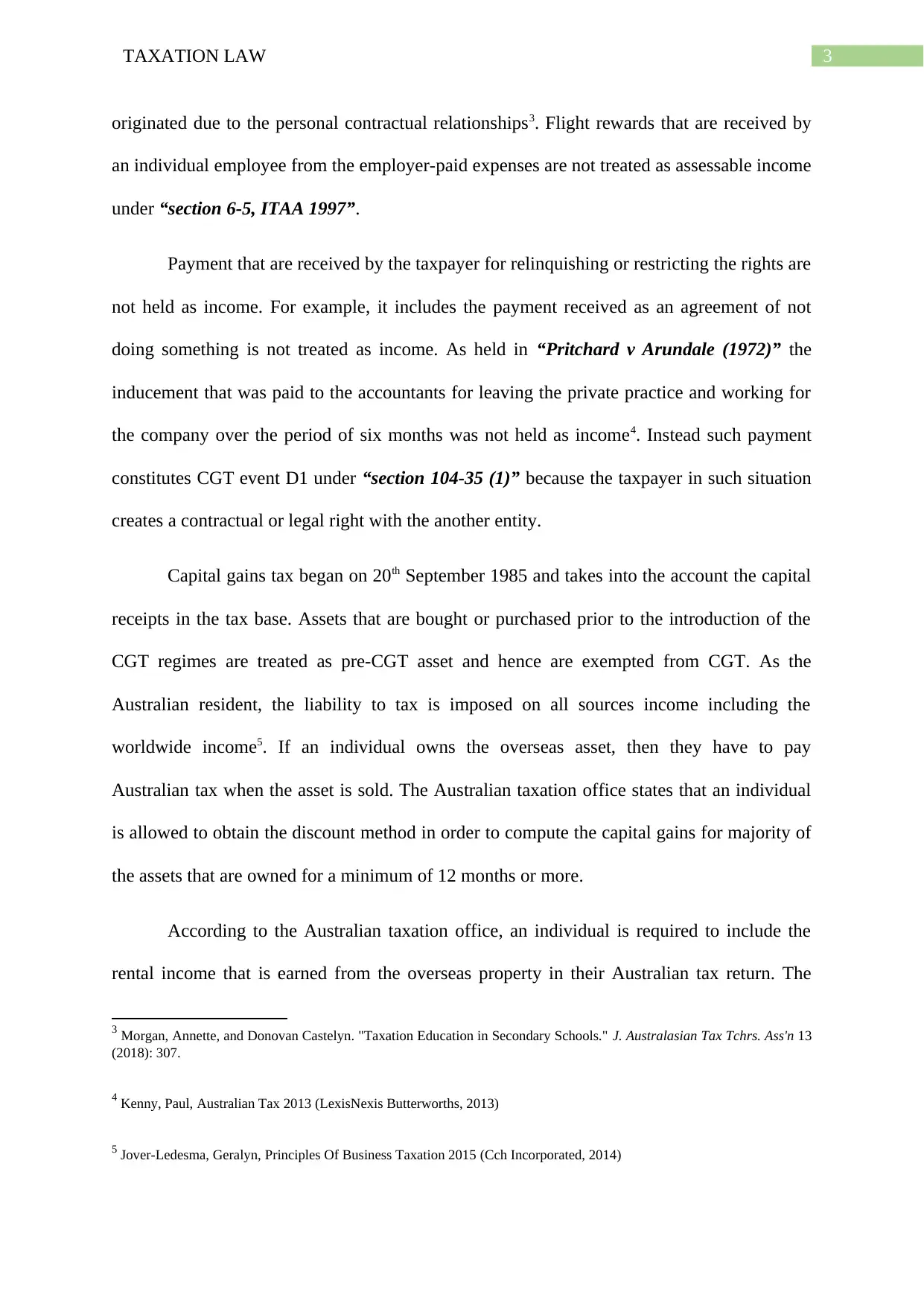
3TAXATION LAW
originated due to the personal contractual relationships3. Flight rewards that are received by
an individual employee from the employer-paid expenses are not treated as assessable income
under “section 6-5, ITAA 1997”.
Payment that are received by the taxpayer for relinquishing or restricting the rights are
not held as income. For example, it includes the payment received as an agreement of not
doing something is not treated as income. As held in “Pritchard v Arundale (1972)” the
inducement that was paid to the accountants for leaving the private practice and working for
the company over the period of six months was not held as income4. Instead such payment
constitutes CGT event D1 under “section 104-35 (1)” because the taxpayer in such situation
creates a contractual or legal right with the another entity.
Capital gains tax began on 20th September 1985 and takes into the account the capital
receipts in the tax base. Assets that are bought or purchased prior to the introduction of the
CGT regimes are treated as pre-CGT asset and hence are exempted from CGT. As the
Australian resident, the liability to tax is imposed on all sources income including the
worldwide income5. If an individual owns the overseas asset, then they have to pay
Australian tax when the asset is sold. The Australian taxation office states that an individual
is allowed to obtain the discount method in order to compute the capital gains for majority of
the assets that are owned for a minimum of 12 months or more.
According to the Australian taxation office, an individual is required to include the
rental income that is earned from the overseas property in their Australian tax return. The
3 Morgan, Annette, and Donovan Castelyn. "Taxation Education in Secondary Schools." J. Australasian Tax Tchrs. Ass'n 13
(2018): 307.
4 Kenny, Paul, Australian Tax 2013 (LexisNexis Butterworths, 2013)
5 Jover-Ledesma, Geralyn, Principles Of Business Taxation 2015 (Cch Incorporated, 2014)
originated due to the personal contractual relationships3. Flight rewards that are received by
an individual employee from the employer-paid expenses are not treated as assessable income
under “section 6-5, ITAA 1997”.
Payment that are received by the taxpayer for relinquishing or restricting the rights are
not held as income. For example, it includes the payment received as an agreement of not
doing something is not treated as income. As held in “Pritchard v Arundale (1972)” the
inducement that was paid to the accountants for leaving the private practice and working for
the company over the period of six months was not held as income4. Instead such payment
constitutes CGT event D1 under “section 104-35 (1)” because the taxpayer in such situation
creates a contractual or legal right with the another entity.
Capital gains tax began on 20th September 1985 and takes into the account the capital
receipts in the tax base. Assets that are bought or purchased prior to the introduction of the
CGT regimes are treated as pre-CGT asset and hence are exempted from CGT. As the
Australian resident, the liability to tax is imposed on all sources income including the
worldwide income5. If an individual owns the overseas asset, then they have to pay
Australian tax when the asset is sold. The Australian taxation office states that an individual
is allowed to obtain the discount method in order to compute the capital gains for majority of
the assets that are owned for a minimum of 12 months or more.
According to the Australian taxation office, an individual is required to include the
rental income that is earned from the overseas property in their Australian tax return. The
3 Morgan, Annette, and Donovan Castelyn. "Taxation Education in Secondary Schools." J. Australasian Tax Tchrs. Ass'n 13
(2018): 307.
4 Kenny, Paul, Australian Tax 2013 (LexisNexis Butterworths, 2013)
5 Jover-Ledesma, Geralyn, Principles Of Business Taxation 2015 (Cch Incorporated, 2014)
Paraphrase This Document
Need a fresh take? Get an instant paraphrase of this document with our AI Paraphraser
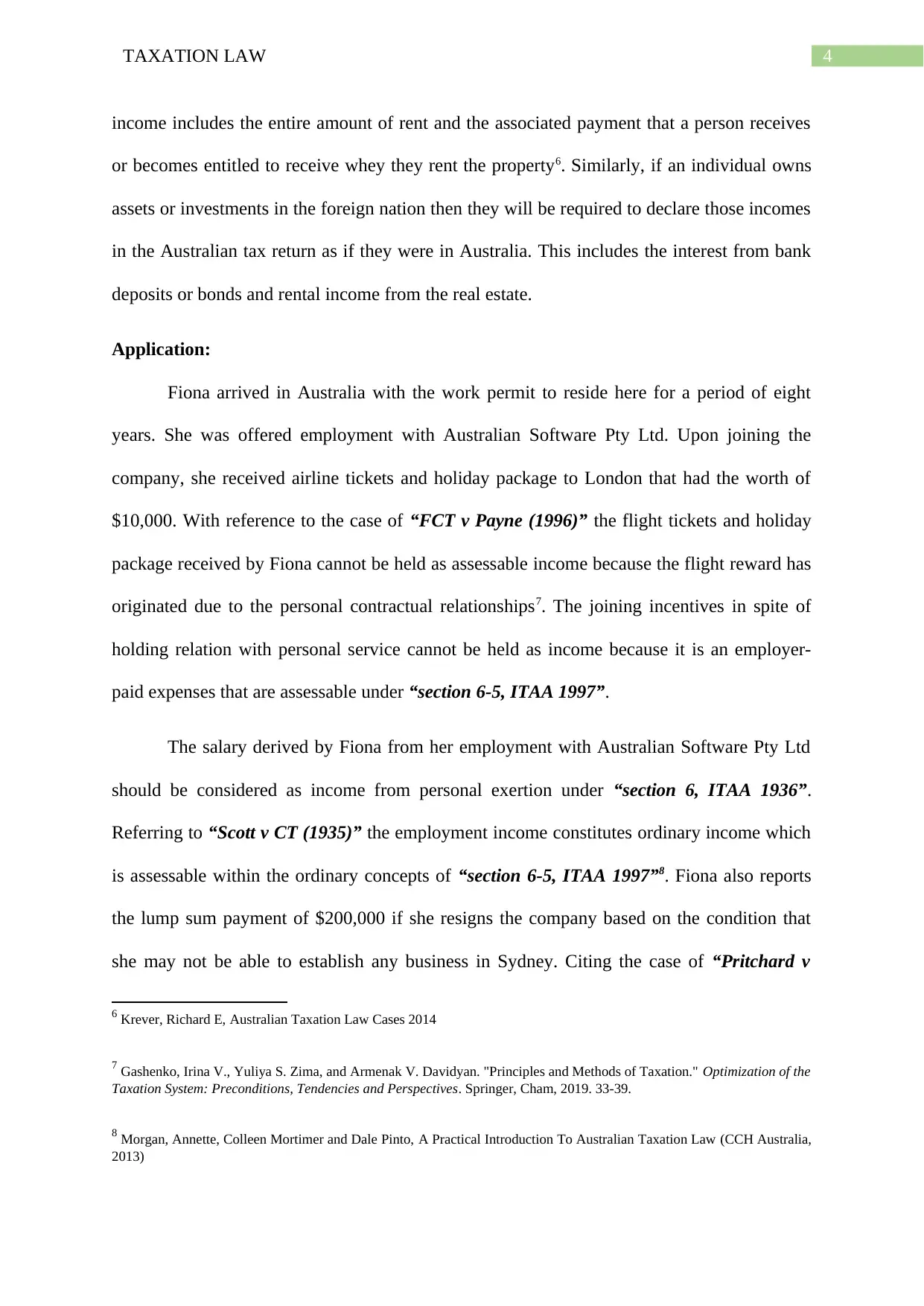
4TAXATION LAW
income includes the entire amount of rent and the associated payment that a person receives
or becomes entitled to receive whey they rent the property6. Similarly, if an individual owns
assets or investments in the foreign nation then they will be required to declare those incomes
in the Australian tax return as if they were in Australia. This includes the interest from bank
deposits or bonds and rental income from the real estate.
Application:
Fiona arrived in Australia with the work permit to reside here for a period of eight
years. She was offered employment with Australian Software Pty Ltd. Upon joining the
company, she received airline tickets and holiday package to London that had the worth of
$10,000. With reference to the case of “FCT v Payne (1996)” the flight tickets and holiday
package received by Fiona cannot be held as assessable income because the flight reward has
originated due to the personal contractual relationships7. The joining incentives in spite of
holding relation with personal service cannot be held as income because it is an employer-
paid expenses that are assessable under “section 6-5, ITAA 1997”.
The salary derived by Fiona from her employment with Australian Software Pty Ltd
should be considered as income from personal exertion under “section 6, ITAA 1936”.
Referring to “Scott v CT (1935)” the employment income constitutes ordinary income which
is assessable within the ordinary concepts of “section 6-5, ITAA 1997”8. Fiona also reports
the lump sum payment of $200,000 if she resigns the company based on the condition that
she may not be able to establish any business in Sydney. Citing the case of “Pritchard v
6 Krever, Richard E, Australian Taxation Law Cases 2014
7 Gashenko, Irina V., Yuliya S. Zima, and Armenak V. Davidyan. "Principles and Methods of Taxation." Optimization of the
Taxation System: Preconditions, Tendencies and Perspectives. Springer, Cham, 2019. 33-39.
8 Morgan, Annette, Colleen Mortimer and Dale Pinto, A Practical Introduction To Australian Taxation Law (CCH Australia,
2013)
income includes the entire amount of rent and the associated payment that a person receives
or becomes entitled to receive whey they rent the property6. Similarly, if an individual owns
assets or investments in the foreign nation then they will be required to declare those incomes
in the Australian tax return as if they were in Australia. This includes the interest from bank
deposits or bonds and rental income from the real estate.
Application:
Fiona arrived in Australia with the work permit to reside here for a period of eight
years. She was offered employment with Australian Software Pty Ltd. Upon joining the
company, she received airline tickets and holiday package to London that had the worth of
$10,000. With reference to the case of “FCT v Payne (1996)” the flight tickets and holiday
package received by Fiona cannot be held as assessable income because the flight reward has
originated due to the personal contractual relationships7. The joining incentives in spite of
holding relation with personal service cannot be held as income because it is an employer-
paid expenses that are assessable under “section 6-5, ITAA 1997”.
The salary derived by Fiona from her employment with Australian Software Pty Ltd
should be considered as income from personal exertion under “section 6, ITAA 1936”.
Referring to “Scott v CT (1935)” the employment income constitutes ordinary income which
is assessable within the ordinary concepts of “section 6-5, ITAA 1997”8. Fiona also reports
the lump sum payment of $200,000 if she resigns the company based on the condition that
she may not be able to establish any business in Sydney. Citing the case of “Pritchard v
6 Krever, Richard E, Australian Taxation Law Cases 2014
7 Gashenko, Irina V., Yuliya S. Zima, and Armenak V. Davidyan. "Principles and Methods of Taxation." Optimization of the
Taxation System: Preconditions, Tendencies and Perspectives. Springer, Cham, 2019. 33-39.
8 Morgan, Annette, Colleen Mortimer and Dale Pinto, A Practical Introduction To Australian Taxation Law (CCH Australia,
2013)
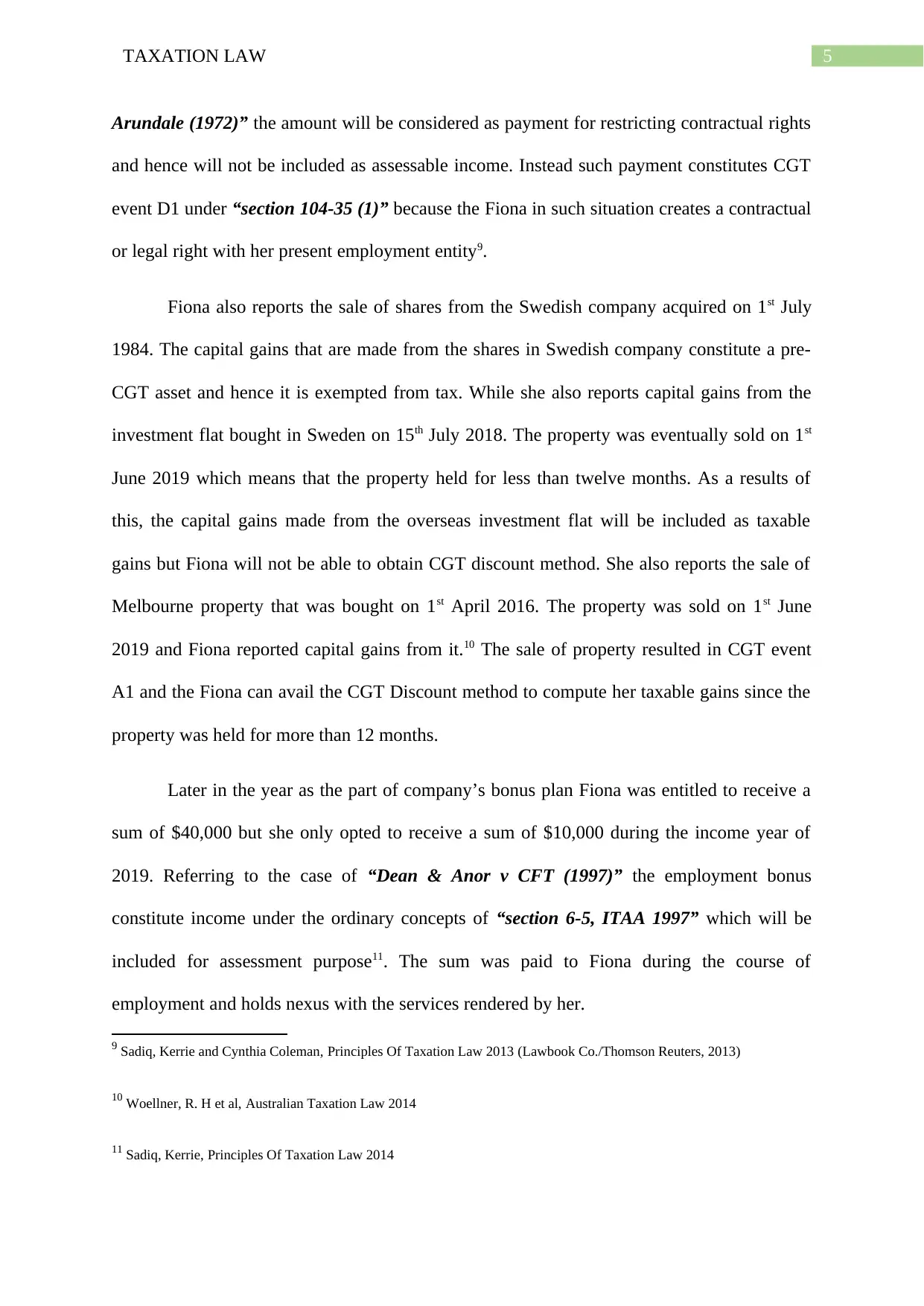
5TAXATION LAW
Arundale (1972)” the amount will be considered as payment for restricting contractual rights
and hence will not be included as assessable income. Instead such payment constitutes CGT
event D1 under “section 104-35 (1)” because the Fiona in such situation creates a contractual
or legal right with her present employment entity9.
Fiona also reports the sale of shares from the Swedish company acquired on 1st July
1984. The capital gains that are made from the shares in Swedish company constitute a pre-
CGT asset and hence it is exempted from tax. While she also reports capital gains from the
investment flat bought in Sweden on 15th July 2018. The property was eventually sold on 1st
June 2019 which means that the property held for less than twelve months. As a results of
this, the capital gains made from the overseas investment flat will be included as taxable
gains but Fiona will not be able to obtain CGT discount method. She also reports the sale of
Melbourne property that was bought on 1st April 2016. The property was sold on 1st June
2019 and Fiona reported capital gains from it.10 The sale of property resulted in CGT event
A1 and the Fiona can avail the CGT Discount method to compute her taxable gains since the
property was held for more than 12 months.
Later in the year as the part of company’s bonus plan Fiona was entitled to receive a
sum of $40,000 but she only opted to receive a sum of $10,000 during the income year of
2019. Referring to the case of “Dean & Anor v CFT (1997)” the employment bonus
constitute income under the ordinary concepts of “section 6-5, ITAA 1997” which will be
included for assessment purpose11. The sum was paid to Fiona during the course of
employment and holds nexus with the services rendered by her.
9 Sadiq, Kerrie and Cynthia Coleman, Principles Of Taxation Law 2013 (Lawbook Co./Thomson Reuters, 2013)
10 Woellner, R. H et al, Australian Taxation Law 2014
11 Sadiq, Kerrie, Principles Of Taxation Law 2014
Arundale (1972)” the amount will be considered as payment for restricting contractual rights
and hence will not be included as assessable income. Instead such payment constitutes CGT
event D1 under “section 104-35 (1)” because the Fiona in such situation creates a contractual
or legal right with her present employment entity9.
Fiona also reports the sale of shares from the Swedish company acquired on 1st July
1984. The capital gains that are made from the shares in Swedish company constitute a pre-
CGT asset and hence it is exempted from tax. While she also reports capital gains from the
investment flat bought in Sweden on 15th July 2018. The property was eventually sold on 1st
June 2019 which means that the property held for less than twelve months. As a results of
this, the capital gains made from the overseas investment flat will be included as taxable
gains but Fiona will not be able to obtain CGT discount method. She also reports the sale of
Melbourne property that was bought on 1st April 2016. The property was sold on 1st June
2019 and Fiona reported capital gains from it.10 The sale of property resulted in CGT event
A1 and the Fiona can avail the CGT Discount method to compute her taxable gains since the
property was held for more than 12 months.
Later in the year as the part of company’s bonus plan Fiona was entitled to receive a
sum of $40,000 but she only opted to receive a sum of $10,000 during the income year of
2019. Referring to the case of “Dean & Anor v CFT (1997)” the employment bonus
constitute income under the ordinary concepts of “section 6-5, ITAA 1997” which will be
included for assessment purpose11. The sum was paid to Fiona during the course of
employment and holds nexus with the services rendered by her.
9 Sadiq, Kerrie and Cynthia Coleman, Principles Of Taxation Law 2013 (Lawbook Co./Thomson Reuters, 2013)
10 Woellner, R. H et al, Australian Taxation Law 2014
11 Sadiq, Kerrie, Principles Of Taxation Law 2014
⊘ This is a preview!⊘
Do you want full access?
Subscribe today to unlock all pages.

Trusted by 1+ million students worldwide
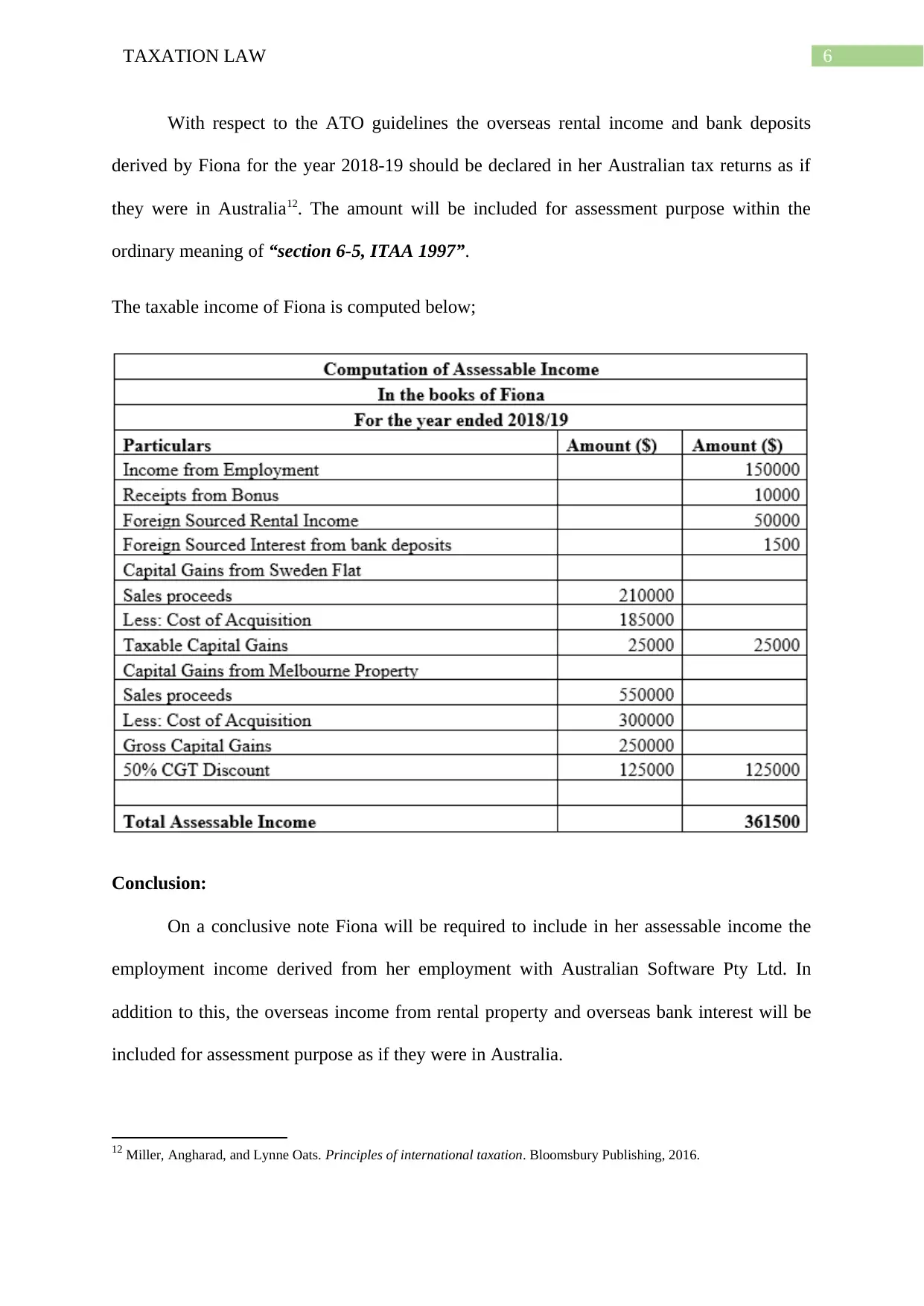
6TAXATION LAW
With respect to the ATO guidelines the overseas rental income and bank deposits
derived by Fiona for the year 2018-19 should be declared in her Australian tax returns as if
they were in Australia12. The amount will be included for assessment purpose within the
ordinary meaning of “section 6-5, ITAA 1997”.
The taxable income of Fiona is computed below;
Conclusion:
On a conclusive note Fiona will be required to include in her assessable income the
employment income derived from her employment with Australian Software Pty Ltd. In
addition to this, the overseas income from rental property and overseas bank interest will be
included for assessment purpose as if they were in Australia.
12 Miller, Angharad, and Lynne Oats. Principles of international taxation. Bloomsbury Publishing, 2016.
With respect to the ATO guidelines the overseas rental income and bank deposits
derived by Fiona for the year 2018-19 should be declared in her Australian tax returns as if
they were in Australia12. The amount will be included for assessment purpose within the
ordinary meaning of “section 6-5, ITAA 1997”.
The taxable income of Fiona is computed below;
Conclusion:
On a conclusive note Fiona will be required to include in her assessable income the
employment income derived from her employment with Australian Software Pty Ltd. In
addition to this, the overseas income from rental property and overseas bank interest will be
included for assessment purpose as if they were in Australia.
12 Miller, Angharad, and Lynne Oats. Principles of international taxation. Bloomsbury Publishing, 2016.
Paraphrase This Document
Need a fresh take? Get an instant paraphrase of this document with our AI Paraphraser
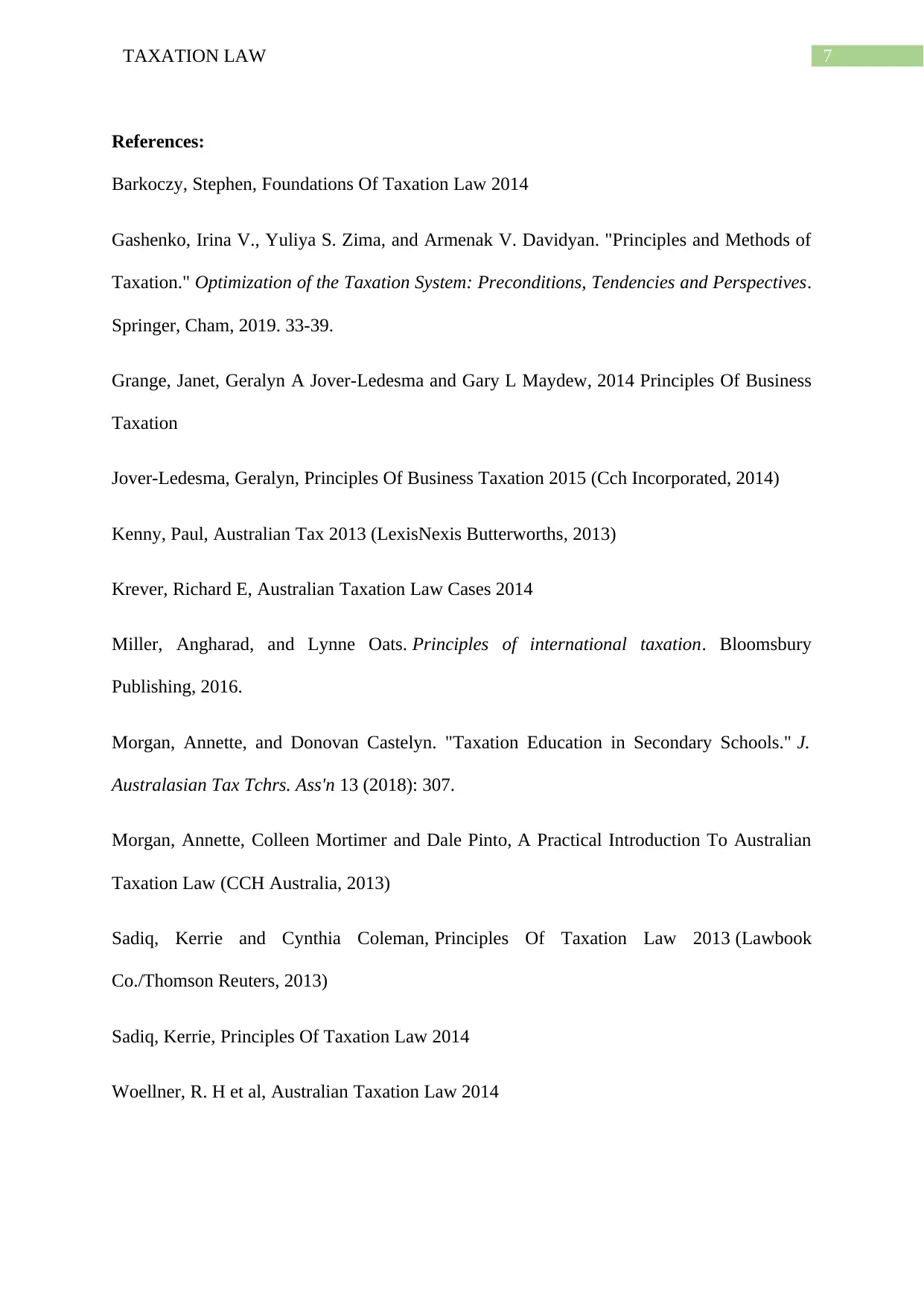
7TAXATION LAW
References:
Barkoczy, Stephen, Foundations Of Taxation Law 2014
Gashenko, Irina V., Yuliya S. Zima, and Armenak V. Davidyan. "Principles and Methods of
Taxation." Optimization of the Taxation System: Preconditions, Tendencies and Perspectives.
Springer, Cham, 2019. 33-39.
Grange, Janet, Geralyn A Jover-Ledesma and Gary L Maydew, 2014 Principles Of Business
Taxation
Jover-Ledesma, Geralyn, Principles Of Business Taxation 2015 (Cch Incorporated, 2014)
Kenny, Paul, Australian Tax 2013 (LexisNexis Butterworths, 2013)
Krever, Richard E, Australian Taxation Law Cases 2014
Miller, Angharad, and Lynne Oats. Principles of international taxation. Bloomsbury
Publishing, 2016.
Morgan, Annette, and Donovan Castelyn. "Taxation Education in Secondary Schools." J.
Australasian Tax Tchrs. Ass'n 13 (2018): 307.
Morgan, Annette, Colleen Mortimer and Dale Pinto, A Practical Introduction To Australian
Taxation Law (CCH Australia, 2013)
Sadiq, Kerrie and Cynthia Coleman, Principles Of Taxation Law 2013 (Lawbook
Co./Thomson Reuters, 2013)
Sadiq, Kerrie, Principles Of Taxation Law 2014
Woellner, R. H et al, Australian Taxation Law 2014
References:
Barkoczy, Stephen, Foundations Of Taxation Law 2014
Gashenko, Irina V., Yuliya S. Zima, and Armenak V. Davidyan. "Principles and Methods of
Taxation." Optimization of the Taxation System: Preconditions, Tendencies and Perspectives.
Springer, Cham, 2019. 33-39.
Grange, Janet, Geralyn A Jover-Ledesma and Gary L Maydew, 2014 Principles Of Business
Taxation
Jover-Ledesma, Geralyn, Principles Of Business Taxation 2015 (Cch Incorporated, 2014)
Kenny, Paul, Australian Tax 2013 (LexisNexis Butterworths, 2013)
Krever, Richard E, Australian Taxation Law Cases 2014
Miller, Angharad, and Lynne Oats. Principles of international taxation. Bloomsbury
Publishing, 2016.
Morgan, Annette, and Donovan Castelyn. "Taxation Education in Secondary Schools." J.
Australasian Tax Tchrs. Ass'n 13 (2018): 307.
Morgan, Annette, Colleen Mortimer and Dale Pinto, A Practical Introduction To Australian
Taxation Law (CCH Australia, 2013)
Sadiq, Kerrie and Cynthia Coleman, Principles Of Taxation Law 2013 (Lawbook
Co./Thomson Reuters, 2013)
Sadiq, Kerrie, Principles Of Taxation Law 2014
Woellner, R. H et al, Australian Taxation Law 2014
1 out of 8
Related Documents
Your All-in-One AI-Powered Toolkit for Academic Success.
+13062052269
info@desklib.com
Available 24*7 on WhatsApp / Email
![[object Object]](/_next/static/media/star-bottom.7253800d.svg)
Unlock your academic potential
Copyright © 2020–2026 A2Z Services. All Rights Reserved. Developed and managed by ZUCOL.





